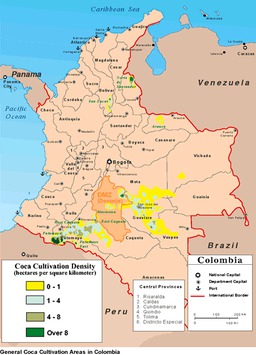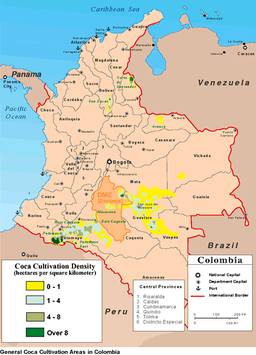
The Colombia government has decided to stop the spraying of weed killers in the coca fields of southern Colombia.
Colombian police planes have sprayed the fields with a powerful weed killer from 1994 as part of s strategy to destroy coca leaves from which cocaine is extracted. The country has received more than $2 billion in funding from the US to take out the massive cocaine fields. But now, health reasons seem to have stopped the Colombian government from the practice. Glyphosate, the active ingredient in the herbicide used to kill coca, is considered as toxic. Over the past two decades over 4 million acres of land in Colombia have been sprayed with the herbicide, which kills coca plants
According to a report in NPR, Daniel Mejia from the Drug and Security Research Center in Bogota has confirmed after a four-year study of coca-growing regions that health problems increased immediately after cocaine fields were fumigated. "In our own study we find that exposure to glyphosate used in the spraying campaigns in Colombia causes respiratory, dermatological problems and miscarriages," he said.
Meanwhile, the WHO has also said that the active ingredient could be a carcinogenic substance. Now the Colombian government has initiated a phasing out of the program. Justice Minister Yesid Reyes has announced that the crop-dusting flights will probably end by October.
At the same time, the country’s cocaine production has not gone down even after these measures. Colombia's coca crop expanded by 39 percent last year, according to official data and cocaine production may have jumped from 185 tons to 245 tons. The Colombia government opted for aerial eradication with American crop-dusters and glyphosate, which is used by agro-industry all across the globe from 1994.
Peru and Bolivia are the two other main cocaine-producing countries. But these countries never embraced the aerial spray idea and were into manual eradication. But Colombia, with its rebel guerrilla fighters, have long protected coca crops.
Monsanto, which manufactures glyphosate, has noted that the herbicide poses no risk to humans. Colombian President Juan Manuel Santos has announced that instead of peasant coca farmers, the government will go after big-time smugglers to effectively eradicate cocaine from the country.
Colombian police planes have sprayed the fields with a powerful weed killer from 1994 as part of s strategy to destroy coca leaves from which cocaine is extracted. The country has received more than $2 billion in funding from the US to take out the massive cocaine fields. But now, health reasons seem to have stopped the Colombian government from the practice. Glyphosate, the active ingredient in the herbicide used to kill coca, is considered as toxic. Over the past two decades over 4 million acres of land in Colombia have been sprayed with the herbicide, which kills coca plants
According to a report in NPR, Daniel Mejia from the Drug and Security Research Center in Bogota has confirmed after a four-year study of coca-growing regions that health problems increased immediately after cocaine fields were fumigated. "In our own study we find that exposure to glyphosate used in the spraying campaigns in Colombia causes respiratory, dermatological problems and miscarriages," he said.
Meanwhile, the WHO has also said that the active ingredient could be a carcinogenic substance. Now the Colombian government has initiated a phasing out of the program. Justice Minister Yesid Reyes has announced that the crop-dusting flights will probably end by October.
At the same time, the country’s cocaine production has not gone down even after these measures. Colombia's coca crop expanded by 39 percent last year, according to official data and cocaine production may have jumped from 185 tons to 245 tons. The Colombia government opted for aerial eradication with American crop-dusters and glyphosate, which is used by agro-industry all across the globe from 1994.
Peru and Bolivia are the two other main cocaine-producing countries. But these countries never embraced the aerial spray idea and were into manual eradication. But Colombia, with its rebel guerrilla fighters, have long protected coca crops.
Monsanto, which manufactures glyphosate, has noted that the herbicide poses no risk to humans. Colombian President Juan Manuel Santos has announced that instead of peasant coca farmers, the government will go after big-time smugglers to effectively eradicate cocaine from the country.





